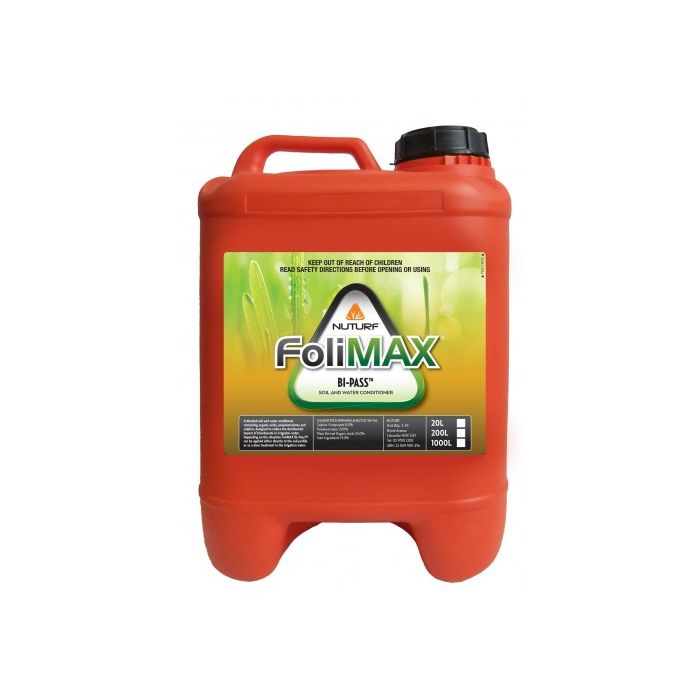FoliMAX Bi-Pass Soil and Water Conditioner
Estimate Delivery
Globe Pest Solutions Kwinana
In Stock16 Thomas Rd
Kwinana Beach
WA
6167
Globe Pest Solutions Tullamarine
Low On stock19 Silicon Place
Tullamarine
VIC
3043
Globe Pest Solutions Newcastle
Low On stock11 Nevin Close
Gateshead
NSW
2290
Globe Pest Solutions Blacktown
Low On stockUnit 1, Building 2 / 13 Bessemer Street
Blacktown
NSW
2148
Globe Pest Solutions Adelaide
Low On stock134-140 Frederick St
Welland
SA
5007
Globe Pest Solutions Brisbane
Awaiting Stock579 Boundary Road
Archerfield
QLD
4108
Globe Pest Solutions Padstow
Awaiting Stock39 Gow Street
Padstow
NSW
2211
FoliMAX Bi-Pass Soil and Water Conditioner counteracts excess bicarbonate and carbonate in recycled/ effluent irrigation water. The organic compounds in FoliMAX Bi-Pass which include polyphenolic compounds and lignosulphonic acid to offset the antagonistic effect of soil and water based bicarbonate.
Many recycled irrigation water sources and calcareous (limestone) soils contain high levels of bicarbonate and carbonate, both of which can adversely impact plant growth by raising soil and water pH, increasing soil salinity, and affecting the availability and uptake of nutrients and many critical micro-nutrients from the soil.
FoliMAX Bi-Pass can be used as a descaling agent to reduce Calcium scale deposits from irrigation lines. Normal use rates and intervals can prevent deposition and accumulation of lime scale. Higher rates may be required to clean out previously blocked lines.
FoliMAX BI-PASS Guaranteed Minimum Analysis:
- Organic Acid: 55%
- Calcium (Ca): 1.3%
- Sulphur (S): 1.9%
- Sugar: 10%
FoliMAX BI-PASS Product Characteristics:
- pH: 2 - 2.5
- Specific Gravity: 1.28
- Appearance: Brown, viscous product with slight ammonia smell
- Solubility: 100%
Key Benefits of FoliMAX BI-PASS
- Reduces bicarbonate and carbonate in irrigation water and soil solution.
- Reduces Calcium scale deposits in irrigation lines.
- Improves the plant availability of nutrients in the soil and water.
- Proven performance in turf management.
- Source of metabolisable energy for soil microbes.
- Acidifies irrigation water.
- Releases bound nutrients in alkaline soils.
- Increases cation exchange capacity (CEC).
Real results using real science
Carbonate and Bicarbonate are both anions (negatively charged) and therefore will attract cations (positively charged) namely calcium, magnesium, sodium, potassium. Carbonate and Bicarbonate readily bind with calcium forming calcium carbonate (CaCO3) or Calcium Bicarbonate (Ca HCO3).
Furthermore when high bicarbonate irrigation water reaches the soil, the calcium can be removed (from being attached to the soil particle) and be less available for plant uptake.
This removal of calcium then allows for any sodium in solution to replace the calcium on exchange sites of the soil. Due to calcium having a 2+ charges and sodium having a 1+ charge, 2 sodium ions will replace 1 calcium ion. This will also have an effect on magnesium in the soil.
The influence high bicarbonates have on reducing the plant availability of calcium (and also magnesium) from the soil and water system also impact on the sodium in solution. The high bicarbonates impact the Sodium Adsorption Ratio (SAR) by effectively increasing the dominance of sodium in solution due to the reduction in calcium and magnesium availability.
The impact that bicarbonates have on SAR can often be seen in a water analysis reported as ‘Corrected SAR’. The SAR has direct impact on the stability of the soil aggregates and the overall water infiltration as seen in Figure 3. If the SAR is high and the EC is low then the rate of water infiltration into the soil can be reduced.
Continued use of high bicarbonate water leads to a high soil pH. When Na (Sodium) is the predominant cation in the soil, pH may be as high as 9.5. However, when Calcium predominates, soil pH generally stabilizes around 8.0. High pH can induce nutrient deficiencies and inefficiencies such as iron and manganese deficiencies by rendering these micronutrients unavailable to the plant roots. High soil pH can also favour the development of root diseases, such as Take-All Patch.
| Brand | FoliMAX |
|---|---|
| Product Form | Liquid |
| Product Alias | folimax-bi-pass-soil-and-water-conditioner |
| Product Analysis | Sulphur Compounds 8.0% |
| Application Rate | 20-50 mL per 100m² |
| Australian Made | Yes |
What are the benefits of the FoliMAX range?
- Turf specific fertiliser

